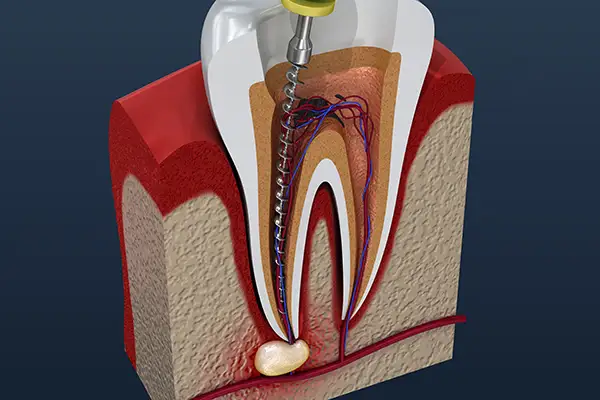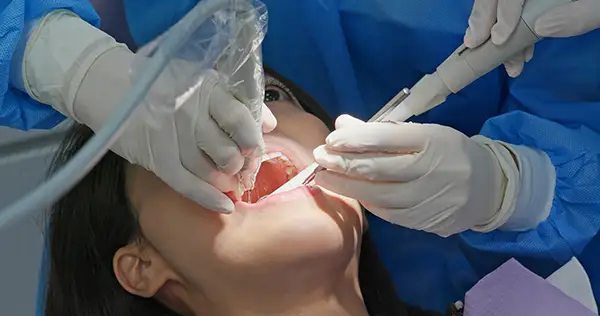Root Canal Treatment in Columbus, OH
 Persistent tooth pain or sensitivity could signal an infection deep within the tooth. Root canal treatment is a reliable, effective procedure that preserves natural teeth by removing the infected pulp and sealing the interior. At Capitol Square Dental, we provide comfortable, advanced root canal therapy in Columbus, OH, to help patients relieve pain and avoid tooth extractions. Persistent tooth pain or sensitivity could signal an infection deep within the tooth. Root canal treatment is a reliable, effective procedure that preserves natural teeth by removing the infected pulp and sealing the interior. At Capitol Square Dental, we provide comfortable, advanced root canal therapy in Columbus, OH, to help patients relieve pain and avoid tooth extractions.
What Is Root Canal Therapy?
Root canal therapy is a restorative dental procedure used to treat infections or inflammation within the pulp of a tooth. The pulp is the innermost part containing nerves and blood vessels. When it's compromised—typically due to deep decay, repeated dental procedures, or trauma—a root canal is necessary to save the tooth.
During the procedure, the infected pulp is removed, the canal is cleaned and disinfected, and the tooth is sealed to prevent reinfection. Most teeth treated with root canals are later restored with a crown for long-term strength and function.
Signs You May Need a Root Canal
If you're experiencing any of the following symptoms, it could indicate that a root canal treatment is necessary:
| • |
Severe Tooth Pain - Especially when chewing or applying pressure.
|
| • |
Prolonged Sensitivity - Lingering pain or sensitivity to hot or cold temperatures.
|
| • |
Darkening of the Tooth - Discoloration can indicate nerve damage.
|
| • |
Swelling or Tenderness - Especially near the gums or surrounding area.
|
| • |
Pimple on the Gums - A recurring pimple or bump may indicate a draining abscess. |
Not all pain means a root canal is needed, but it’s best to get symptoms evaluated promptly to avoid complications.
 Benefits of Root Canal Treatment
Modern root canal therapy is virtually painless and offers several benefits compared to tooth extraction or leaving an infection untreated.
| • |
Pain Relief - Eliminates the source of pain caused by infection or inflammation.
|
| • |
Tooth Preservation - Saves your natural tooth, maintaining alignment and bite strength.
|
| • |
Efficient and Effective - Usually completed in one or two visits.
|
| • |
Prevents Further Damage - Protects surrounding teeth from shifting or infection.
|
| • |
Cost-Effective - More affordable than replacing a lost tooth with an implant or bridge. |
Thanks to advances in technology and technique, most patients return to normal activities shortly after treatment.
What to Expect During a Root Canal Procedure
At Capitol Square Dental, we make sure your root canal treatment is as smooth and stress-free as possible.
| 1. |
Your dentist will begin with digital X-rays and a full assessment of the tooth.
|
| 2. |
Local anesthesia is used to ensure complete comfort during the procedure.
|
| 3. |
The infected pulp is removed, and the root canals are cleaned and shaped.
|
| 4. |
Canals are filled with a biocompatible material and sealed.
|
| 5. |
In most cases, a custom crown is placed afterward to restore strength and function. |
You’ll receive care instructions and follow-up support to ensure a successful recovery and long-lasting results.
Why Choose Us for Root Canals in Columbus
Choosing the right provider for your root canal therapy makes a big difference in your experience and outcome. At Capitol Square Dental, we offer:
| • |
Gentle, Patient-Focused Care - We prioritize your comfort and peace of mind every step of the way.
|
| • |
Modern Technology - Digital imaging, rotary tools, and advanced sterilization ensure precision and safety.
|
| • |
Experienced Dental Team - Our dentists have extensive experience in endodontic care.
|
| • |
Same-Day Emergency Appointments - We’re here when you need urgent root canal relief.
|
| • |
Comprehensive Follow-Up - We guide you through recovery and ensure long-term success. |
Whether you're in pain or have been referred for endodontic care, we’re your trusted partner for root canals in Columbus, OH.
FAQs
Is a root canal painful?
With modern anesthetics and techniques, root canal treatment is no more painful than getting a filling. Most patients feel immediate relief from the pain caused by infection and experience only mild soreness afterward.
How long does a root canal take?
Most root canals are completed in one to two visits, each lasting about 60 to 90 minutes. Complex cases or molars may require additional time or appointments.
Do I need a crown after a root canal?
In most cases, yes. A crown helps protect the treated tooth from fracture and restores its full function, especially for molars that endure heavy chewing pressure.
What happens if I don’t get a root canal?
Without treatment, the infection inside the tooth can spread to surrounding tissues and even the jawbone, leading to abscesses, severe pain, and possible tooth loss. Root canal therapy is the best way to save an infected tooth and prevent further issues. |

 Persistent tooth pain or sensitivity could signal an infection deep within the tooth. Root canal treatment is a reliable, effective procedure that preserves natural teeth by removing the infected pulp and sealing the interior. At Capitol Square Dental, we provide comfortable, advanced root canal therapy in Columbus, OH, to help patients relieve pain and avoid tooth extractions.
Persistent tooth pain or sensitivity could signal an infection deep within the tooth. Root canal treatment is a reliable, effective procedure that preserves natural teeth by removing the infected pulp and sealing the interior. At Capitol Square Dental, we provide comfortable, advanced root canal therapy in Columbus, OH, to help patients relieve pain and avoid tooth extractions.
